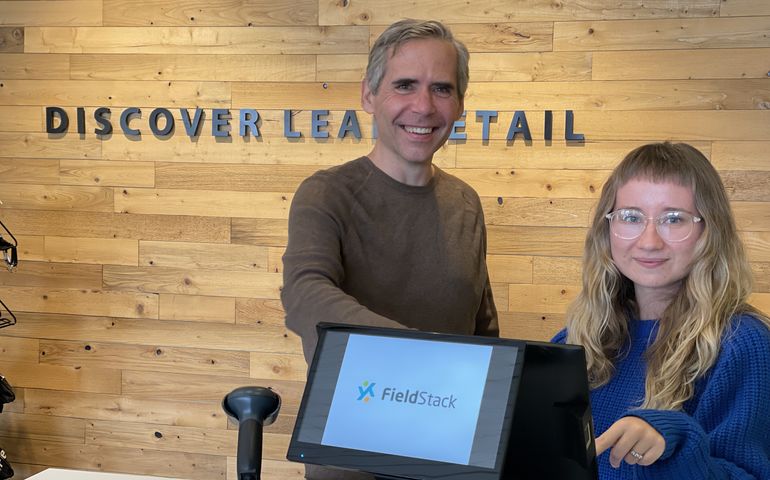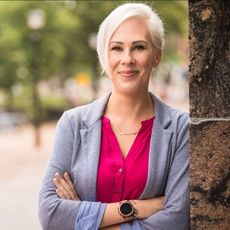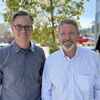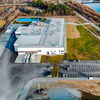
Processing Your Payment
Please do not leave this page until complete. This can take a few moments.
- News
-
Editions
View Digital Editions
Biweekly Issues
- December 15, 2025
- December 1, 2025
- Nov. 17, 2025
- November 03, 2025
- October 20, 2025
- October 6, 2025
- + More
Special Editions
- Lists
- Viewpoints
-
Our Events
Event Info
Award Honorees
- Calendar
- Biz Marketplace
Growing Portland retail tech provider FieldStack eyes national expansion
 Courtesy / FieldStack
FieldStack’s founder, Brett Wickard, seen here with software developer Elizabeth Demin, is growing his staff and seeks to expand the tech company’s reach.
Courtesy / FieldStack
FieldStack’s founder, Brett Wickard, seen here with software developer Elizabeth Demin, is growing his staff and seeks to expand the tech company’s reach.
FieldStack, a Portland-based provider of integrated retail technology, has beefed up its executive ranks — and the growth may be a sign of things to come.
The company hired Amanda Neuts as vice president of client success, Matt Theodores as chief marketing officer and Manny Archibald as director of HR.
The newly created roles are designed to help lead the company as it eyes further national expansion, with a focus on the success of existing clients, the onboarding of new clients and the continued growth and development of employees, said FieldStack’s founder and CEO, Brett Wickard.
“Today’s retailers are increasingly looking for innovative cloud-based solutions, and as importantly, full-service partners who can help them realize the many benefits of technology while allowing them to focus on serving their customers,” said Wickard.
The investment is part of a broader hiring plan and builds capacity for the company’s expansion.
Wickard, a Bowdoin College alumnus, is perhaps better known as the founder of Bull Moose, a Portland-based music and entertainment retailer that opened in 1989 and now has 11 locations.
In 2013, he founded FieldStack as a cloud-based suite of lean retail applications built to work together and leverage real-time data, advanced analytics and automation. Serving mid-sized and large omni-channel retailers that include department stores and specialty retailers, FieldStack has 34 employees in Portland and is growing.
Mainebiz asked Wickard about how FieldStack evolved and what he expects for growth. Here’s an edited transcript.
Mainebiz: You provide a cloud-based suite of lean retail applications. What does that mean?
Brett Wickard: Retailers operate in a complex environment. There’s e-ecommerce, stores, warehouses, special orders, point-of-sale devices, curbside pick-up, self-check-out units and more. Our platform integrates all of those operations, in real time, by allowing them to ‘talk’ with one another across the organization.
When all of the operations are talking with each other, the retailer can react a lot more quickly. Say a client is selling out a product in one of their stores. That’s communicated immediately up their supply chain to their warehouse, which places orders with their vendors to prepare for future demand.
MB: What was the lightbulb moment that inspired FieldStack?
BW: Bull Moose was just this little retail chain in Maine. We were contacted by Universal Music [a large music distributor and source of Bull Moose products]. They had been analyzing their customer data and found that Bull Moose had been running far more efficiently than their other customers. They showed us their metrics. Our inventory coverage was much stronger, and returns were far lower. They said, ‘Whatever your secret is, could you sell it to the rest of our customers?’ And we did have a secret. It was having our operations talk to each other in real time. We realized that this could be valuable for all retailers.
MB: Going back further, how did you come upon this idea of integrated operations?
BW: One great thing about retail is that you get to know your customers really well. We were having the conversations: Why do people choose to come in? Why does somebody buy something? If we could find a way to capture that information, we could get ahead of other retailers.
Early on, we realized there are certain people who, when they bought something, everyone else was buying it a few days later. One guy — his name was Jack. Now we call him ‘Magic Jack.’ Jack would buy something and then everyone would buy it. So we started thinking about how we could use that information to be more predictive. We started a frequent buyer program and measured what people were buying. The secret was that we were also getting products sold back to us for resale. That mattered, too, because it helped us predict what people wanted and didn’t want.
MB: How did that concept unfold as a software business?
BW: Folks who were selling music heard Bull Moose had some sort of secret and they wanted the Bull Moose system. When we officially launched FieldStack, I hired our first director of sales and we reached out to other type of retail stores.
We make a compelling case. We’re very cost-effective compared to other solutions, and we can prove that we can do what we say we’ll do. When we’re talking with potential clients, we analyze their operation using their own data and show them what their operation will look like using FieldStack. So we can help people feel comfortable with FieldStack before it even goes in. And because we’re born of retail — and almost everyone here has worked in retail or we make everyone go out and work in retail — clients know that we’re a software company that eats, sleeps and breathes retail. That makes a difference.
MB: So you actually send new hires out to work in retail, if they haven’t before?
BW: We’ll have mathematicians and top-tier developers and we tell them to work in a retail store. It’s incredibly beneficial. There’s a technology phrase called ‘dog fooding’ [using software to work out the kinks]. Using FieldStack in the wild, you get an experience you wouldn’t have unless you’ve been faced with a line of customers, wrapping up orders for them. We love having folks experience that, because it changes how we write our software. We write with the clerks in mind; the clerks are the ones under the most pressure. Our strategy is to make it so clerks can just start using our software and not feel they have a giant learning curve.
MB: How many folks are on your team?
BW: We have 34 employees now, with three starting this week to work in client success and product development. Pre-pandemic, recruiting folks to come to Maine was challenging. That has gotten much easier. Now Maine is a selling point. For one person we were recruiting, we were calling her references, and it turned out that one of her references had just moved to Maine themselves.
MB: What has your growth looked like since 2013?
BW: We’ve grown every year. Right now we’re growing much more quickly — more than 40% year-over-year. In fact, we’re already more than 40% this year over last year, and we’ll probably be significantly ahead of that. Next year looks to be the same. And we’re able to scale. The great thing about the cloud is that we can take on every retail sale around the world. We don’t have to own infrastructure. We can add clients with incredible speed. So we’ve got the pedal to the metal and will grow as quickly as we can.
MB: How many clients do you have?
BW: We have clients in 38 states. We have thousands of field stack installs out there. FieldStack powers retailers ranging in size from a handful of stores in a single city to national chains with over a hundred stores and growing. Our platform is architected to support retailers with hundreds or even thousands of stores and is also an excellent solution for regional chains in the five- to 20-store range. We’re a catalyst for companies that are ready to grow.
MB: What does installation look like?
BW: Sometimes we go onsite, sometimes we have third parties help, sometimes the client does it. We send devices that are plug-and-play. Chain locations can plug the devices into their network, they type in the code and they’re good to go.
If a client is using FieldStack in an office setting, they can just click on a link and it installs on their device. But retail stores have things like cash drawers and customer displays, so we send those devices to clients preinstalled with FieldStack so they don’t have to do anything. They just plug in the device and they’re ready to go. That’s a big edge for us and for the retailer: Since devices can get beat up, we’ll send them a new one and they can just swap it in.
MB: What does the device look like?
BW: We’re sending them the cash drawer, the credit card reader, the customer displays. All of them are integrated FieldStack devices that are ready to talk with each other and are connected to the corporate network.
MB: How much have you invested in the company?
BW: I’d say $10 million to $20 million from the revenue generated by FieldStack. We’re self-financed. We plan to put off taking on investors until money becomes an impediment to our growth. We believe we’ll likely take on investment in about two years. But for now, we’ve reinvesting every penny back into the business and we’re profitable.
MB: What are your revenues?
BW: We haven’t crested $10 million a year yet, but we expect to do so soon.
MB: What’s the significance of the company’s name, FieldStack?
BW: It had to be a name that meant something to us and also had the dot-com available. I’m a math nerd, and stacks and fields are computer science and math terms. But we like that it also connects to Maine — a stack of wood in a field gives you a sense of security in the winter. We love being a cutting-edge tech company in Maine.



Mainebiz web partners

The Giving Guide
The Giving Guide helps nonprofits have the opportunity to showcase and differentiate their organizations so that businesses better understand how they can contribute to a nonprofit’s mission and work.
Learn More
Work for ME
Work for ME is a workforce development tool to help Maine’s employers target Maine’s emerging workforce. Work for ME highlights each industry, its impact on Maine’s economy, the jobs available to entry-level workers, the training and education needed to get a career started.
Learn More
Groundbreaking Maine
Whether you’re a developer, financer, architect, or industry enthusiast, Groundbreaking Maine is crafted to be your go-to source for valuable insights in Maine’s real estate and construction community.
Learn more-
The Giving Guide
The Giving Guide helps nonprofits have the opportunity to showcase and differentiate their organizations so that businesses better understand how they can contribute to a nonprofit’s mission and work.
-
Work for ME
Work for ME is a workforce development tool to help Maine’s employers target Maine’s emerging workforce. Work for ME highlights each industry, its impact on Maine’s economy, the jobs available to entry-level workers, the training and education needed to get a career started.
-
Groundbreaking Maine
Whether you’re a developer, financer, architect, or industry enthusiast, Groundbreaking Maine is crafted to be your go-to source for valuable insights in Maine’s real estate and construction community.
ABOUT
NEW ENGLAND BUSINESS MEDIA SITES
No articles left
Get access now
In order to use this feature, we need some information from you. You can also login or register for a free account.
By clicking submit you are agreeing to our cookie usage and Privacy Policy
Already have an account? Login
Already have an account? Login
Want to create an account? Register
Get access now
In order to use this feature, we need some information from you. You can also login or register for a free account.
By clicking submit you are agreeing to our cookie usage and Privacy Policy
Already have an account? Login
Already have an account? Login
Want to create an account? Register







0 Comments